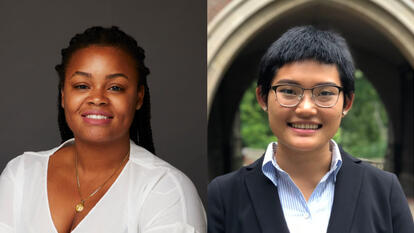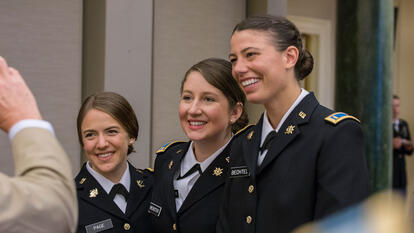Professor Marianne Moore Delivers Wellesley’s 2017 Distinguished Faculty Lecture

Marianne Moore, Frost Professor in Environmental Science and professor of biological sciences, will deliver this year’s Distinguished Faculty Lecture today, Wednesday, April 19 at 12:30 pm in Collins Cinema. Sponsored by the President’s Office, the Distinguished Faculty Lecture was established in 1999 to provide an opportunity for the College’s accomplished and respected faculty members to deliver a public lecture that helps the community reflect on the meaning of a liberal arts education.
In her talk, titled “Casting a Net into the Clear, Cold Soul of Siberia—Lake Baikal,” Moore will illustrate how uniting the sciences with the humanities has been, and will continue to be, crucial to understanding and conserving the largest, deepest, oldest, and most species-rich freshwater lake on the planet.
“The Lake Baikal region of Siberia is on the cusp of enormous economic development, but the region is very unprepared for this,” said Moore in an interview. “Lake Baikal is also threatened by both eutrophication—a dense growth of algae that depletes the shallow waters of oxygen in summer—and climate change. To effectively address these problems, we must use a multidisciplinary approach, which is at the heart of the liberal arts model.”
That approach has worked well since Moore, a world-renowned authority on Lake Baikal, began studying the lake in 1999. In 2000, she and Thomas Hodge, professor of Russian, created the Wellesley College Lake Baikal course, which gives students of various backgrounds and majors the opportunity to spend almost four weeks gathering and analyzing data about the lake and surrounding area.
“[Moore’s] work has enabled students from the sciences and the humanities to take part in one-of-a-kind interdisciplinary, cross-cultural research opportunities.” said President Paula A. Johnson in an announcement to the Wellesley community, “It has led to scientific and culture discoveries that created meaningful change for both Russians and Americans.”
Moore has also collaborated with scientists from the United States, Russia, and other nations, which has led to some important findings. In 2008, for example, analyses of Russian data collected every summer at a single sampling station revealed that the lake had warmed 2.5 degrees Celsius over the past six decades. Subsequent data published last year confirms that warming of the surface waters has occurred lake-wide. “This warming was surprising because it was thought that this lake would be relatively immune to climate warming due to its very cold water and frequent upwellings of the cold water to the lake surface,” Moore said.
Another important discovery came in 2014, when Moore and her co-researchers, Ted Ozersky, then a post-doctoral fellow at Wellesley, and Xiu Ying (Annie) Deng ’15, a biological sciences major, studied the chemical composition of hundreds of teeth from Baikal seals, an endemic species and the only seal that lives exclusively in fresh water. Analysis of the teeth, which had been collected from seals harvested by Russian scientists over multiple decades, revealed that the seals had a high level of mercury in their bodies in the 1960s and 1970s.
“Working with Norwegian collaborators, we found that historical concentrations of mercury in the Baikal seal probably posed a health risk for the seals and possibly for the indigenous people who consume the seal,” Moore said. “The good news is that mercury concentrations today are not of concern.”
Moore said she will discuss these and other findings in her lecture. She will also emphasize the importance of intellectual curiosity and taking a risk. “When Professor Tom Hodge and I first developed the course in 2000, we never expected to teach it more than once. Now, 17 years later, the course is ongoing, and our university partner in Russia is offering a version of our course to visiting students from Europe and developing nations,” she said.
Hodge praises Moore’s dedication, which has helped make her a leading authority on Lake Baikal, advising scientists, journalists, and international policy makers about the area’s scientific and cultural significance. Moore received a grant in 2011 from the National Science Foundation to co-lead a team of 15 scientists, from both the U.S. and Russia, to explore how Lake Baikal’s biodiversity may respond to contemporary climate change. In 2015, the Association for the Sciences of Limnology and Oceanography, the largest body of aquatic scientists in the world, gave her the Ramón Margalef Award for Excellence in Education for her interdisciplinary teaching and outreach activities.
“As global climate change becomes more severe, Marianne’s work on how it affects Lake Baikal’s ecosystems becomes more and more relevant,” Hodge said. “In a nutshell, she and her American colleagues have brought sophisticated Western statistical and modeling techniques to bear on the trove of environmental data that has been religiously assembled by Russian scientists for many decades.”
Hodge added that he looks forward to her lecture, and to their continued collaboration. “Marianne’s patience, and her respect for Russian culture, have led colleagues—Russian and Western alike—to trust her,” he said. “The result has been scholarly symbiosis, not competition. Students, too, have benefited enormously, both the 90-some-odd Wellesley undergraduates who’ve taken the Baikal course and the various graduate students who have joined in Marianne’s NSF-sponsored research.”
Moore said she hopes her lecture will reinforce the value of a liberal arts education, which fosters interdisciplinary thinking, collaborations, and solutions. “Often it’s through interdisciplinary approaches that the major breakthroughs in science are now occurring,” she said. “The language fluency and cultural knowledge of my students and co-instructors have allowed my USA-Russian scientific teams to cast their nets into the clear, cold soul of Siberia.”



